A Report on Social Work Interventions in Early Diagnosed Dementia
VerifiedAdded on 2023/01/07
|46
|19223
|92
Report
AI Summary
This report delves into the critical area of social work interventions for individuals diagnosed with dementia at an early stage. It begins by defining dementia and highlighting the various challenges patients face, including cognitive decline, communication difficulties, and limitations in daily tasks. The report emphasizes the importance of early diagnosis and intervention to improve health outcomes and quality of life. It explores the legal and policy frameworks that protect individuals with dementia, underscoring the ethical and legal responsibilities of healthcare professionals. The study examines intervention strategies, including social care services, therapeutic interventions, and skill-building training for patients. The report also presents the aim, objectives, and research questions guiding the study, and includes a literature review, methodology, and discussion of findings related to the effectiveness of social work interventions, obstacles faced by social workers, and the lived experiences of early diagnosed adults with dementia. The report concludes with implications, recommendations, and a comprehensive list of references.
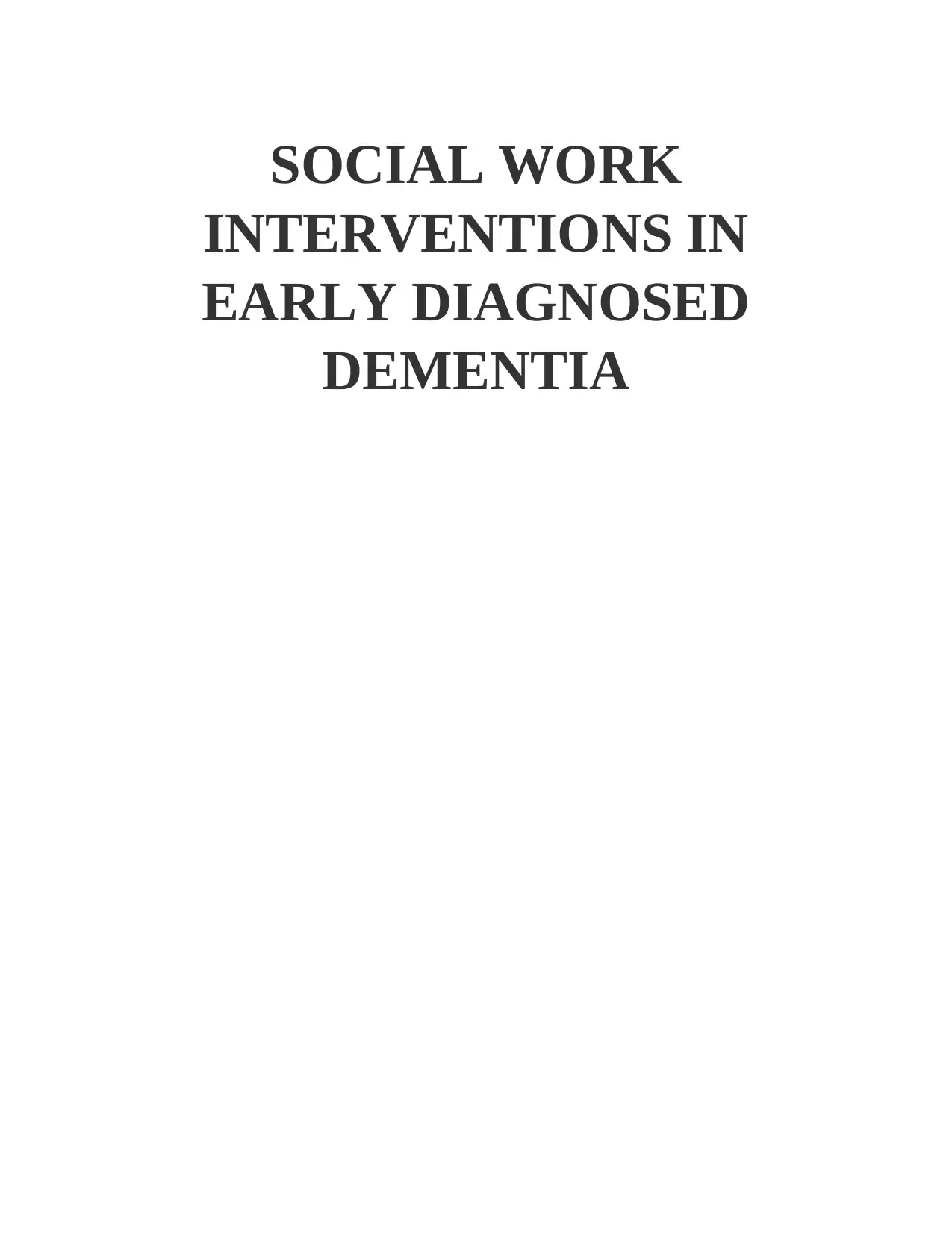
SOCIAL WORK
INTERVENTIONS IN
EARLY DIAGNOSED
DEMENTIA
INTERVENTIONS IN
EARLY DIAGNOSED
DEMENTIA
Paraphrase This Document
Need a fresh take? Get an instant paraphrase of this document with our AI Paraphraser
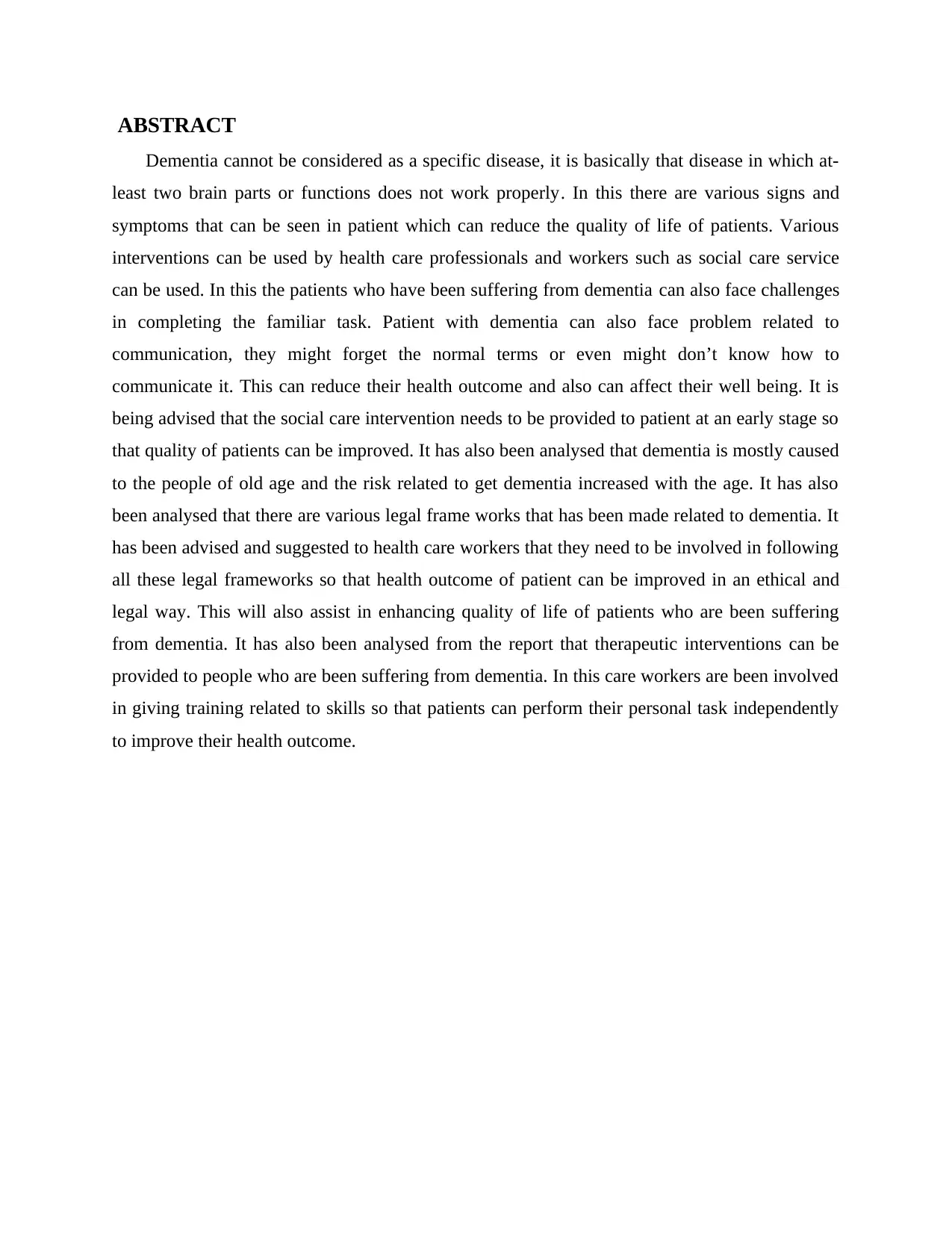
ABSTRACT
Dementia cannot be considered as a specific disease, it is basically that disease in which at-
least two brain parts or functions does not work properly. In this there are various signs and
symptoms that can be seen in patient which can reduce the quality of life of patients. Various
interventions can be used by health care professionals and workers such as social care service
can be used. In this the patients who have been suffering from dementia can also face challenges
in completing the familiar task. Patient with dementia can also face problem related to
communication, they might forget the normal terms or even might don’t know how to
communicate it. This can reduce their health outcome and also can affect their well being. It is
being advised that the social care intervention needs to be provided to patient at an early stage so
that quality of patients can be improved. It has also been analysed that dementia is mostly caused
to the people of old age and the risk related to get dementia increased with the age. It has also
been analysed that there are various legal frame works that has been made related to dementia. It
has been advised and suggested to health care workers that they need to be involved in following
all these legal frameworks so that health outcome of patient can be improved in an ethical and
legal way. This will also assist in enhancing quality of life of patients who are been suffering
from dementia. It has also been analysed from the report that therapeutic interventions can be
provided to people who are been suffering from dementia. In this care workers are been involved
in giving training related to skills so that patients can perform their personal task independently
to improve their health outcome.
Dementia cannot be considered as a specific disease, it is basically that disease in which at-
least two brain parts or functions does not work properly. In this there are various signs and
symptoms that can be seen in patient which can reduce the quality of life of patients. Various
interventions can be used by health care professionals and workers such as social care service
can be used. In this the patients who have been suffering from dementia can also face challenges
in completing the familiar task. Patient with dementia can also face problem related to
communication, they might forget the normal terms or even might don’t know how to
communicate it. This can reduce their health outcome and also can affect their well being. It is
being advised that the social care intervention needs to be provided to patient at an early stage so
that quality of patients can be improved. It has also been analysed that dementia is mostly caused
to the people of old age and the risk related to get dementia increased with the age. It has also
been analysed that there are various legal frame works that has been made related to dementia. It
has been advised and suggested to health care workers that they need to be involved in following
all these legal frameworks so that health outcome of patient can be improved in an ethical and
legal way. This will also assist in enhancing quality of life of patients who are been suffering
from dementia. It has also been analysed from the report that therapeutic interventions can be
provided to people who are been suffering from dementia. In this care workers are been involved
in giving training related to skills so that patients can perform their personal task independently
to improve their health outcome.
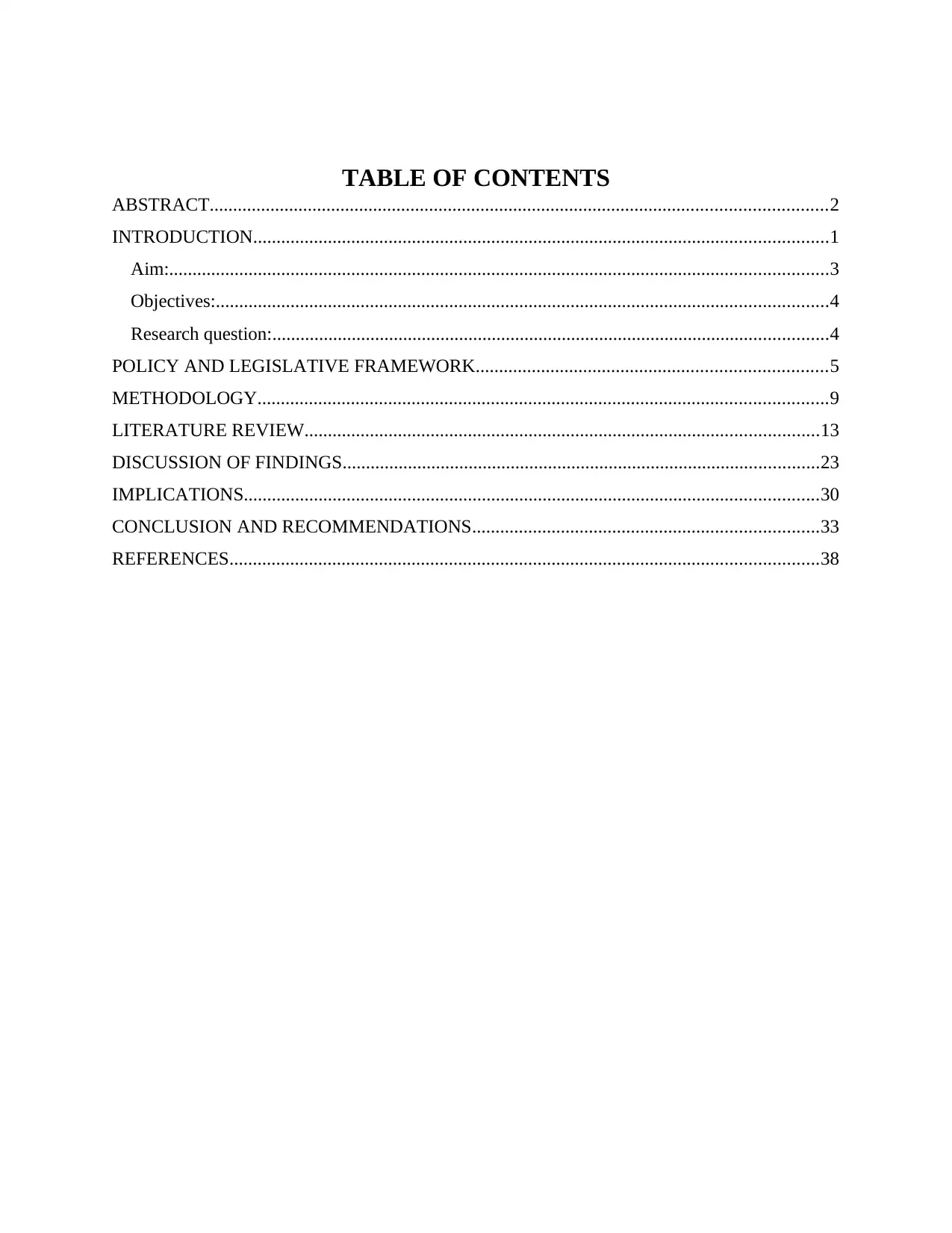
TABLE OF CONTENTS
ABSTRACT....................................................................................................................................2
INTRODUCTION...........................................................................................................................1
Aim:.............................................................................................................................................3
Objectives:...................................................................................................................................4
Research question:.......................................................................................................................4
POLICY AND LEGISLATIVE FRAMEWORK...........................................................................5
METHODOLOGY..........................................................................................................................9
LITERATURE REVIEW..............................................................................................................13
DISCUSSION OF FINDINGS......................................................................................................23
IMPLICATIONS...........................................................................................................................30
CONCLUSION AND RECOMMENDATIONS..........................................................................33
REFERENCES..............................................................................................................................38
ABSTRACT....................................................................................................................................2
INTRODUCTION...........................................................................................................................1
Aim:.............................................................................................................................................3
Objectives:...................................................................................................................................4
Research question:.......................................................................................................................4
POLICY AND LEGISLATIVE FRAMEWORK...........................................................................5
METHODOLOGY..........................................................................................................................9
LITERATURE REVIEW..............................................................................................................13
DISCUSSION OF FINDINGS......................................................................................................23
IMPLICATIONS...........................................................................................................................30
CONCLUSION AND RECOMMENDATIONS..........................................................................33
REFERENCES..............................................................................................................................38
⊘ This is a preview!⊘
Do you want full access?
Subscribe today to unlock all pages.

Trusted by 1+ million students worldwide
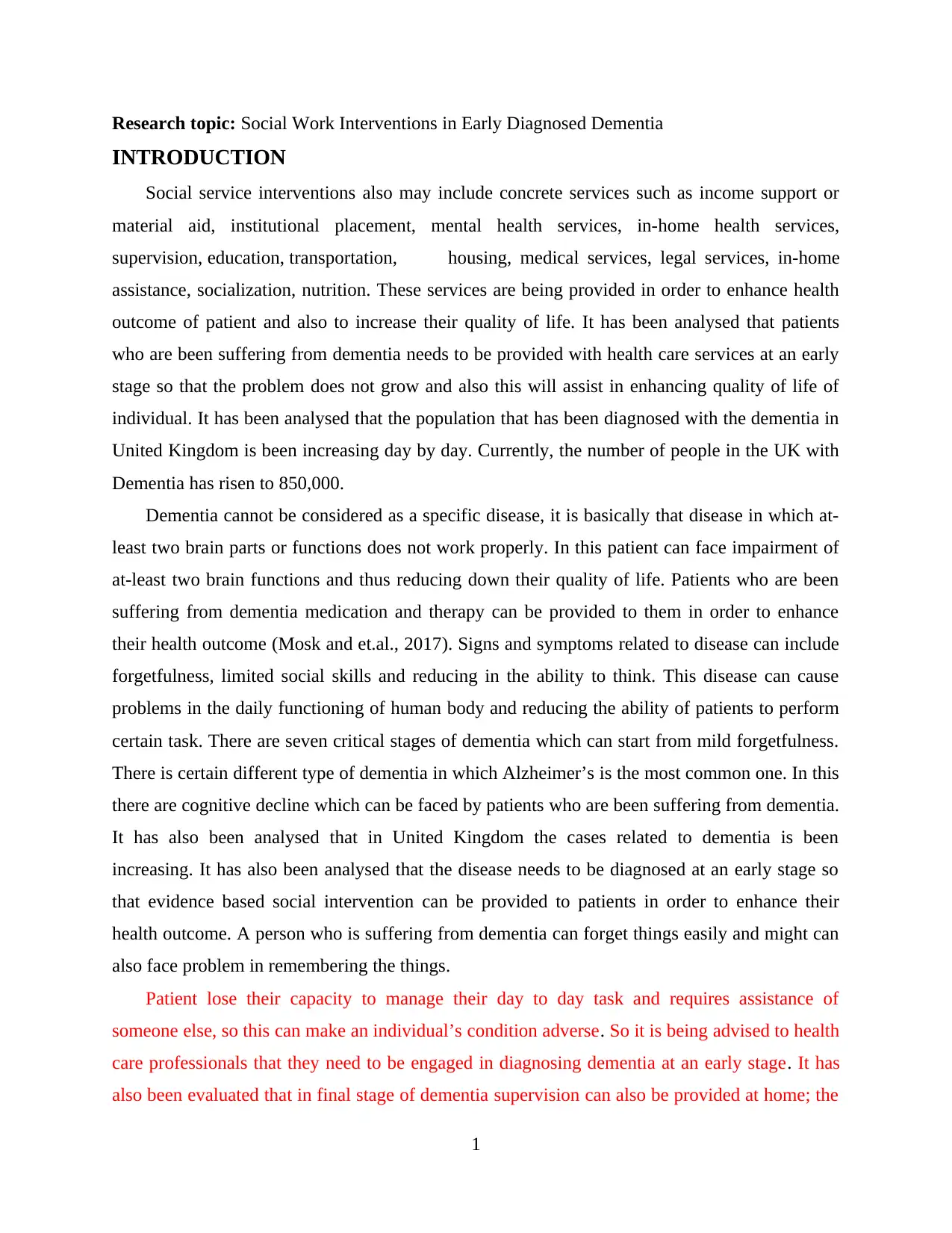
Research topic: Social Work Interventions in Early Diagnosed Dementia
INTRODUCTION
Social service interventions also may include concrete services such as income support or
material aid, institutional placement, mental health services, in-home health services,
supervision, education, transportation, housing, medical services, legal services, in-home
assistance, socialization, nutrition. These services are being provided in order to enhance health
outcome of patient and also to increase their quality of life. It has been analysed that patients
who are been suffering from dementia needs to be provided with health care services at an early
stage so that the problem does not grow and also this will assist in enhancing quality of life of
individual. It has been analysed that the population that has been diagnosed with the dementia in
United Kingdom is been increasing day by day. Currently, the number of people in the UK with
Dementia has risen to 850,000.
Dementia cannot be considered as a specific disease, it is basically that disease in which at-
least two brain parts or functions does not work properly. In this patient can face impairment of
at-least two brain functions and thus reducing down their quality of life. Patients who are been
suffering from dementia medication and therapy can be provided to them in order to enhance
their health outcome (Mosk and et.al., 2017). Signs and symptoms related to disease can include
forgetfulness, limited social skills and reducing in the ability to think. This disease can cause
problems in the daily functioning of human body and reducing the ability of patients to perform
certain task. There are seven critical stages of dementia which can start from mild forgetfulness.
There is certain different type of dementia in which Alzheimer’s is the most common one. In this
there are cognitive decline which can be faced by patients who are been suffering from dementia.
It has also been analysed that in United Kingdom the cases related to dementia is been
increasing. It has also been analysed that the disease needs to be diagnosed at an early stage so
that evidence based social intervention can be provided to patients in order to enhance their
health outcome. A person who is suffering from dementia can forget things easily and might can
also face problem in remembering the things.
Patient lose their capacity to manage their day to day task and requires assistance of
someone else, so this can make an individual’s condition adverse. So it is being advised to health
care professionals that they need to be engaged in diagnosing dementia at an early stage. It has
also been evaluated that in final stage of dementia supervision can also be provided at home; the
1
INTRODUCTION
Social service interventions also may include concrete services such as income support or
material aid, institutional placement, mental health services, in-home health services,
supervision, education, transportation, housing, medical services, legal services, in-home
assistance, socialization, nutrition. These services are being provided in order to enhance health
outcome of patient and also to increase their quality of life. It has been analysed that patients
who are been suffering from dementia needs to be provided with health care services at an early
stage so that the problem does not grow and also this will assist in enhancing quality of life of
individual. It has been analysed that the population that has been diagnosed with the dementia in
United Kingdom is been increasing day by day. Currently, the number of people in the UK with
Dementia has risen to 850,000.
Dementia cannot be considered as a specific disease, it is basically that disease in which at-
least two brain parts or functions does not work properly. In this patient can face impairment of
at-least two brain functions and thus reducing down their quality of life. Patients who are been
suffering from dementia medication and therapy can be provided to them in order to enhance
their health outcome (Mosk and et.al., 2017). Signs and symptoms related to disease can include
forgetfulness, limited social skills and reducing in the ability to think. This disease can cause
problems in the daily functioning of human body and reducing the ability of patients to perform
certain task. There are seven critical stages of dementia which can start from mild forgetfulness.
There is certain different type of dementia in which Alzheimer’s is the most common one. In this
there are cognitive decline which can be faced by patients who are been suffering from dementia.
It has also been analysed that in United Kingdom the cases related to dementia is been
increasing. It has also been analysed that the disease needs to be diagnosed at an early stage so
that evidence based social intervention can be provided to patients in order to enhance their
health outcome. A person who is suffering from dementia can forget things easily and might can
also face problem in remembering the things.
Patient lose their capacity to manage their day to day task and requires assistance of
someone else, so this can make an individual’s condition adverse. So it is being advised to health
care professionals that they need to be engaged in diagnosing dementia at an early stage. It has
also been evaluated that in final stage of dementia supervision can also be provided at home; the
1
Paraphrase This Document
Need a fresh take? Get an instant paraphrase of this document with our AI Paraphraser
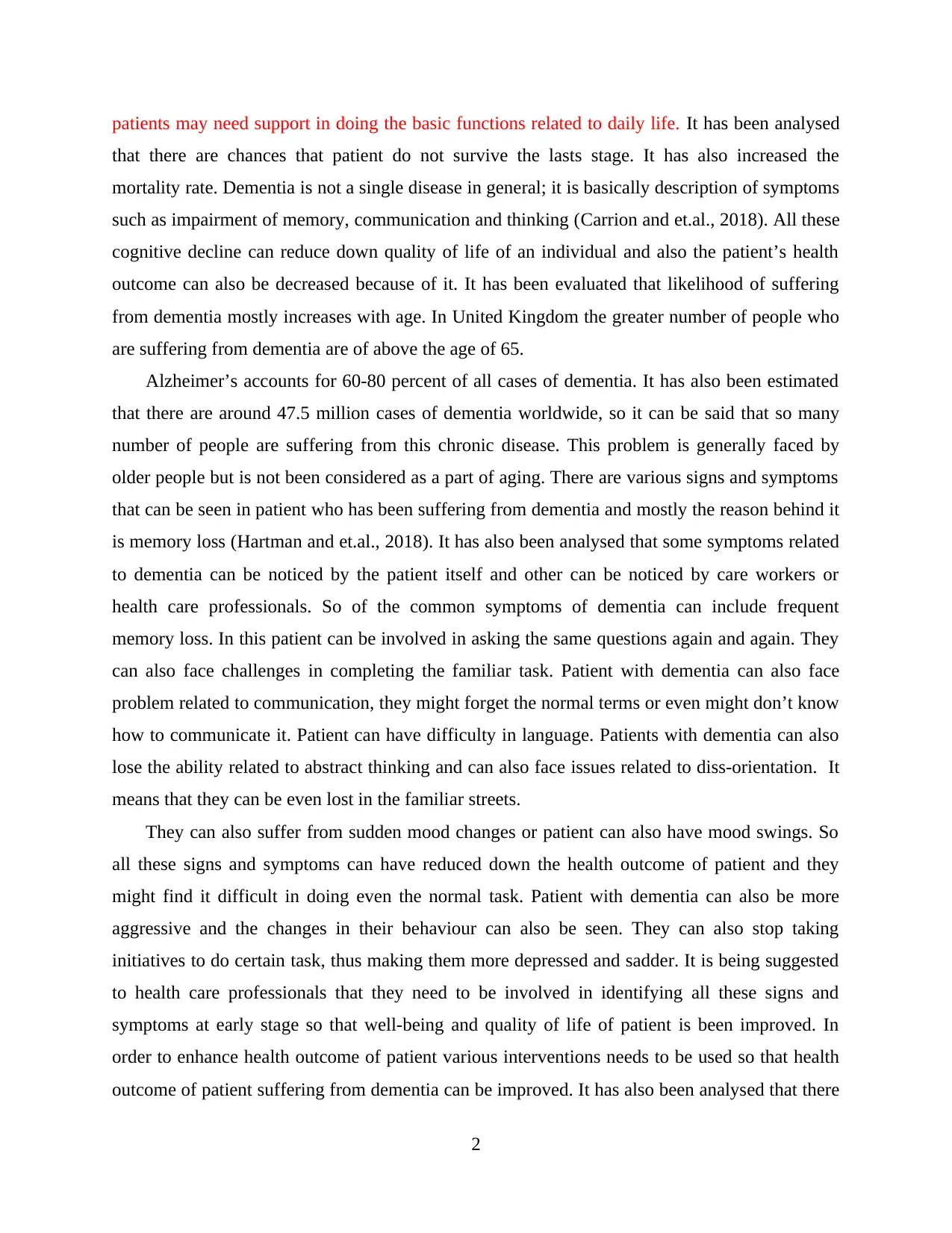
patients may need support in doing the basic functions related to daily life. It has been analysed
that there are chances that patient do not survive the lasts stage. It has also increased the
mortality rate. Dementia is not a single disease in general; it is basically description of symptoms
such as impairment of memory, communication and thinking (Carrion and et.al., 2018). All these
cognitive decline can reduce down quality of life of an individual and also the patient’s health
outcome can also be decreased because of it. It has been evaluated that likelihood of suffering
from dementia mostly increases with age. In United Kingdom the greater number of people who
are suffering from dementia are of above the age of 65.
Alzheimer’s accounts for 60-80 percent of all cases of dementia. It has also been estimated
that there are around 47.5 million cases of dementia worldwide, so it can be said that so many
number of people are suffering from this chronic disease. This problem is generally faced by
older people but is not been considered as a part of aging. There are various signs and symptoms
that can be seen in patient who has been suffering from dementia and mostly the reason behind it
is memory loss (Hartman and et.al., 2018). It has also been analysed that some symptoms related
to dementia can be noticed by the patient itself and other can be noticed by care workers or
health care professionals. So of the common symptoms of dementia can include frequent
memory loss. In this patient can be involved in asking the same questions again and again. They
can also face challenges in completing the familiar task. Patient with dementia can also face
problem related to communication, they might forget the normal terms or even might don’t know
how to communicate it. Patient can have difficulty in language. Patients with dementia can also
lose the ability related to abstract thinking and can also face issues related to diss-orientation. It
means that they can be even lost in the familiar streets.
They can also suffer from sudden mood changes or patient can also have mood swings. So
all these signs and symptoms can have reduced down the health outcome of patient and they
might find it difficult in doing even the normal task. Patient with dementia can also be more
aggressive and the changes in their behaviour can also be seen. They can also stop taking
initiatives to do certain task, thus making them more depressed and sadder. It is being suggested
to health care professionals that they need to be involved in identifying all these signs and
symptoms at early stage so that well-being and quality of life of patient is been improved. In
order to enhance health outcome of patient various interventions needs to be used so that health
outcome of patient suffering from dementia can be improved. It has also been analysed that there
2
that there are chances that patient do not survive the lasts stage. It has also increased the
mortality rate. Dementia is not a single disease in general; it is basically description of symptoms
such as impairment of memory, communication and thinking (Carrion and et.al., 2018). All these
cognitive decline can reduce down quality of life of an individual and also the patient’s health
outcome can also be decreased because of it. It has been evaluated that likelihood of suffering
from dementia mostly increases with age. In United Kingdom the greater number of people who
are suffering from dementia are of above the age of 65.
Alzheimer’s accounts for 60-80 percent of all cases of dementia. It has also been estimated
that there are around 47.5 million cases of dementia worldwide, so it can be said that so many
number of people are suffering from this chronic disease. This problem is generally faced by
older people but is not been considered as a part of aging. There are various signs and symptoms
that can be seen in patient who has been suffering from dementia and mostly the reason behind it
is memory loss (Hartman and et.al., 2018). It has also been analysed that some symptoms related
to dementia can be noticed by the patient itself and other can be noticed by care workers or
health care professionals. So of the common symptoms of dementia can include frequent
memory loss. In this patient can be involved in asking the same questions again and again. They
can also face challenges in completing the familiar task. Patient with dementia can also face
problem related to communication, they might forget the normal terms or even might don’t know
how to communicate it. Patient can have difficulty in language. Patients with dementia can also
lose the ability related to abstract thinking and can also face issues related to diss-orientation. It
means that they can be even lost in the familiar streets.
They can also suffer from sudden mood changes or patient can also have mood swings. So
all these signs and symptoms can have reduced down the health outcome of patient and they
might find it difficult in doing even the normal task. Patient with dementia can also be more
aggressive and the changes in their behaviour can also be seen. They can also stop taking
initiatives to do certain task, thus making them more depressed and sadder. It is being suggested
to health care professionals that they need to be involved in identifying all these signs and
symptoms at early stage so that well-being and quality of life of patient is been improved. In
order to enhance health outcome of patient various interventions needs to be used so that health
outcome of patient suffering from dementia can be improved. It has also been analysed that there
2
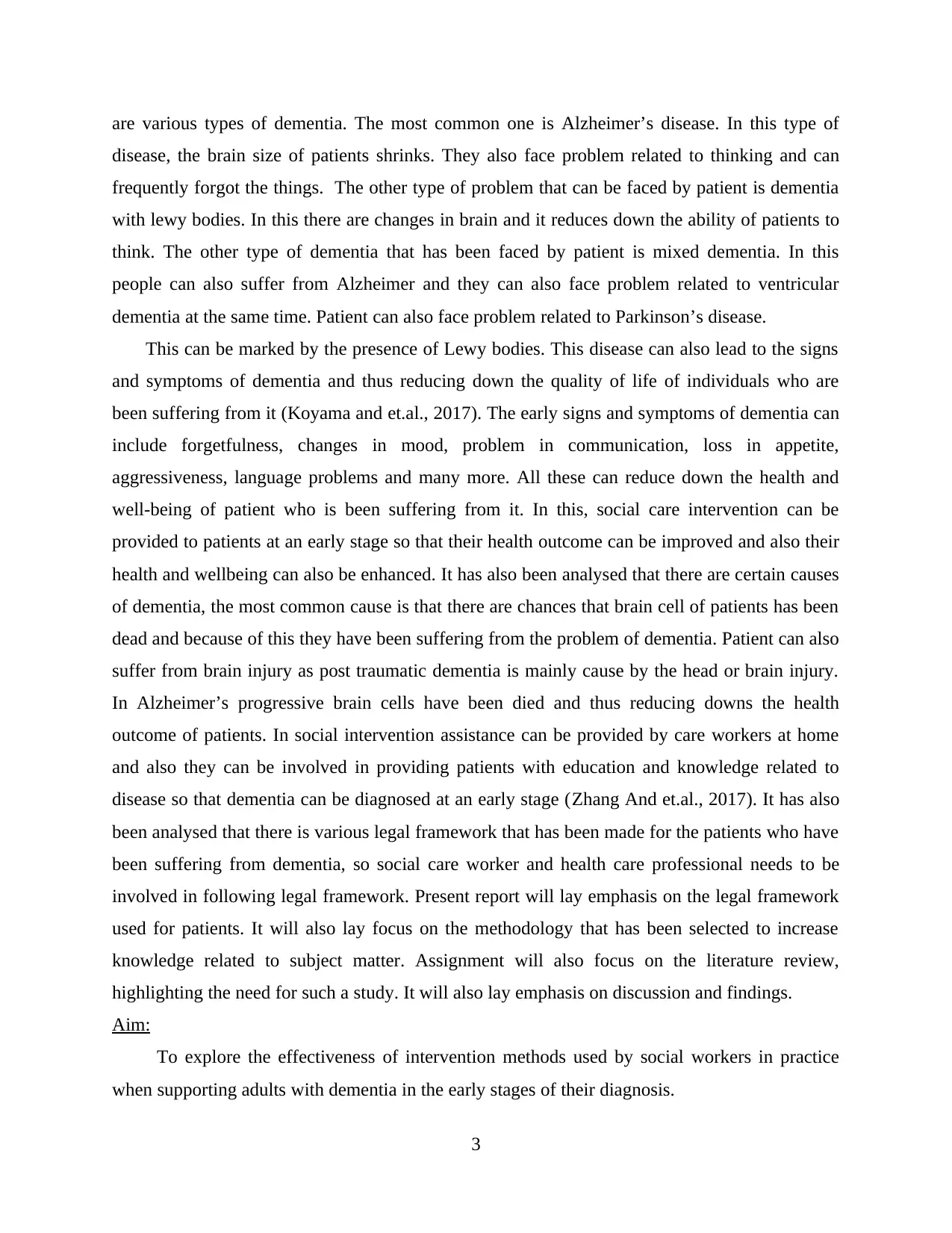
are various types of dementia. The most common one is Alzheimer’s disease. In this type of
disease, the brain size of patients shrinks. They also face problem related to thinking and can
frequently forgot the things. The other type of problem that can be faced by patient is dementia
with lewy bodies. In this there are changes in brain and it reduces down the ability of patients to
think. The other type of dementia that has been faced by patient is mixed dementia. In this
people can also suffer from Alzheimer and they can also face problem related to ventricular
dementia at the same time. Patient can also face problem related to Parkinson’s disease.
This can be marked by the presence of Lewy bodies. This disease can also lead to the signs
and symptoms of dementia and thus reducing down the quality of life of individuals who are
been suffering from it (Koyama and et.al., 2017). The early signs and symptoms of dementia can
include forgetfulness, changes in mood, problem in communication, loss in appetite,
aggressiveness, language problems and many more. All these can reduce down the health and
well-being of patient who is been suffering from it. In this, social care intervention can be
provided to patients at an early stage so that their health outcome can be improved and also their
health and wellbeing can also be enhanced. It has also been analysed that there are certain causes
of dementia, the most common cause is that there are chances that brain cell of patients has been
dead and because of this they have been suffering from the problem of dementia. Patient can also
suffer from brain injury as post traumatic dementia is mainly cause by the head or brain injury.
In Alzheimer’s progressive brain cells have been died and thus reducing downs the health
outcome of patients. In social intervention assistance can be provided by care workers at home
and also they can be involved in providing patients with education and knowledge related to
disease so that dementia can be diagnosed at an early stage (Zhang And et.al., 2017). It has also
been analysed that there is various legal framework that has been made for the patients who have
been suffering from dementia, so social care worker and health care professional needs to be
involved in following legal framework. Present report will lay emphasis on the legal framework
used for patients. It will also lay focus on the methodology that has been selected to increase
knowledge related to subject matter. Assignment will also focus on the literature review,
highlighting the need for such a study. It will also lay emphasis on discussion and findings.
Aim:
To explore the effectiveness of intervention methods used by social workers in practice
when supporting adults with dementia in the early stages of their diagnosis.
3
disease, the brain size of patients shrinks. They also face problem related to thinking and can
frequently forgot the things. The other type of problem that can be faced by patient is dementia
with lewy bodies. In this there are changes in brain and it reduces down the ability of patients to
think. The other type of dementia that has been faced by patient is mixed dementia. In this
people can also suffer from Alzheimer and they can also face problem related to ventricular
dementia at the same time. Patient can also face problem related to Parkinson’s disease.
This can be marked by the presence of Lewy bodies. This disease can also lead to the signs
and symptoms of dementia and thus reducing down the quality of life of individuals who are
been suffering from it (Koyama and et.al., 2017). The early signs and symptoms of dementia can
include forgetfulness, changes in mood, problem in communication, loss in appetite,
aggressiveness, language problems and many more. All these can reduce down the health and
well-being of patient who is been suffering from it. In this, social care intervention can be
provided to patients at an early stage so that their health outcome can be improved and also their
health and wellbeing can also be enhanced. It has also been analysed that there are certain causes
of dementia, the most common cause is that there are chances that brain cell of patients has been
dead and because of this they have been suffering from the problem of dementia. Patient can also
suffer from brain injury as post traumatic dementia is mainly cause by the head or brain injury.
In Alzheimer’s progressive brain cells have been died and thus reducing downs the health
outcome of patients. In social intervention assistance can be provided by care workers at home
and also they can be involved in providing patients with education and knowledge related to
disease so that dementia can be diagnosed at an early stage (Zhang And et.al., 2017). It has also
been analysed that there is various legal framework that has been made for the patients who have
been suffering from dementia, so social care worker and health care professional needs to be
involved in following legal framework. Present report will lay emphasis on the legal framework
used for patients. It will also lay focus on the methodology that has been selected to increase
knowledge related to subject matter. Assignment will also focus on the literature review,
highlighting the need for such a study. It will also lay emphasis on discussion and findings.
Aim:
To explore the effectiveness of intervention methods used by social workers in practice
when supporting adults with dementia in the early stages of their diagnosis.
3
⊘ This is a preview!⊘
Do you want full access?
Subscribe today to unlock all pages.

Trusted by 1+ million students worldwide
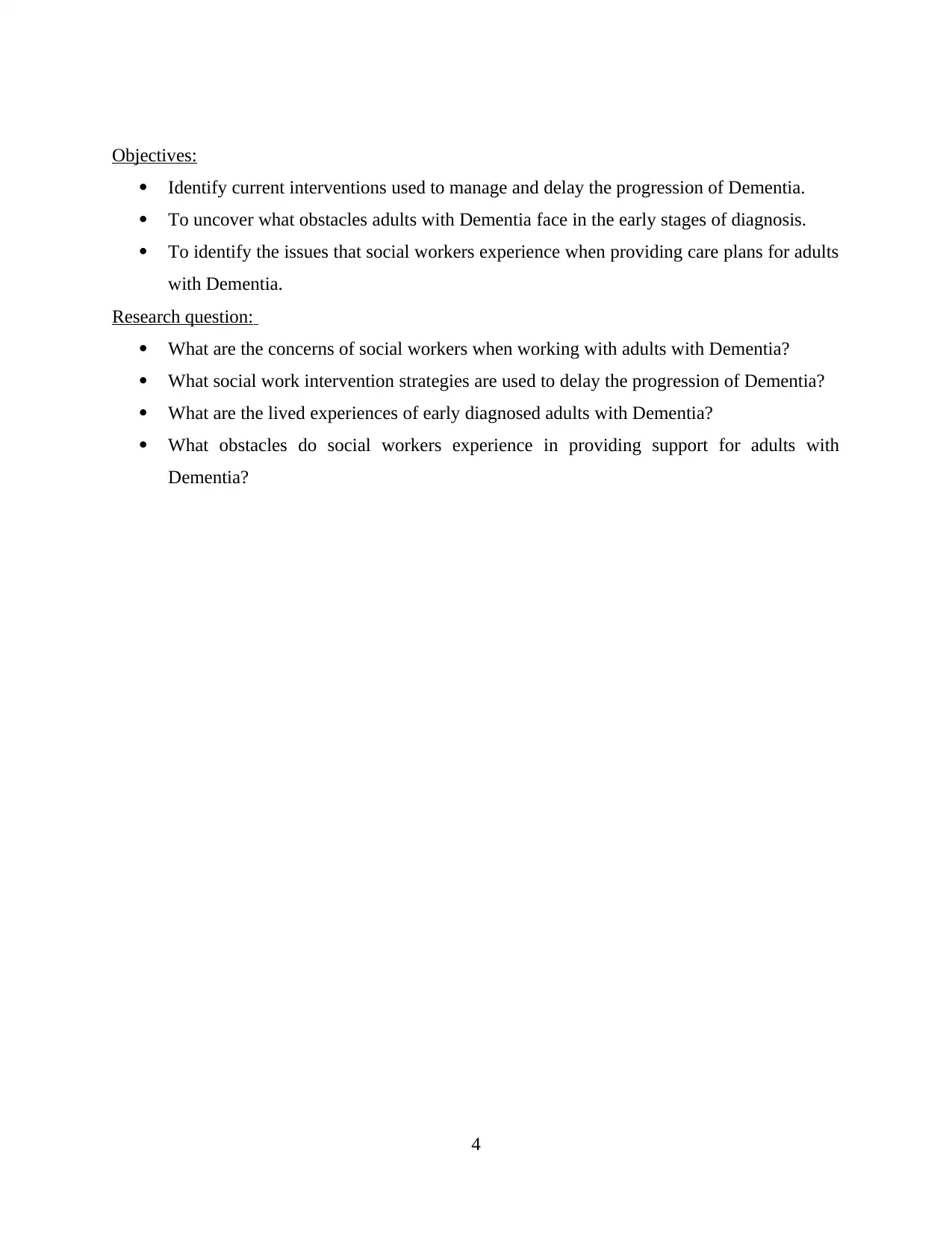
Objectives:
Identify current interventions used to manage and delay the progression of Dementia.
To uncover what obstacles adults with Dementia face in the early stages of diagnosis.
To identify the issues that social workers experience when providing care plans for adults
with Dementia.
Research question:
What are the concerns of social workers when working with adults with Dementia?
What social work intervention strategies are used to delay the progression of Dementia?
What are the lived experiences of early diagnosed adults with Dementia?
What obstacles do social workers experience in providing support for adults with
Dementia?
4
Identify current interventions used to manage and delay the progression of Dementia.
To uncover what obstacles adults with Dementia face in the early stages of diagnosis.
To identify the issues that social workers experience when providing care plans for adults
with Dementia.
Research question:
What are the concerns of social workers when working with adults with Dementia?
What social work intervention strategies are used to delay the progression of Dementia?
What are the lived experiences of early diagnosed adults with Dementia?
What obstacles do social workers experience in providing support for adults with
Dementia?
4
Paraphrase This Document
Need a fresh take? Get an instant paraphrase of this document with our AI Paraphraser
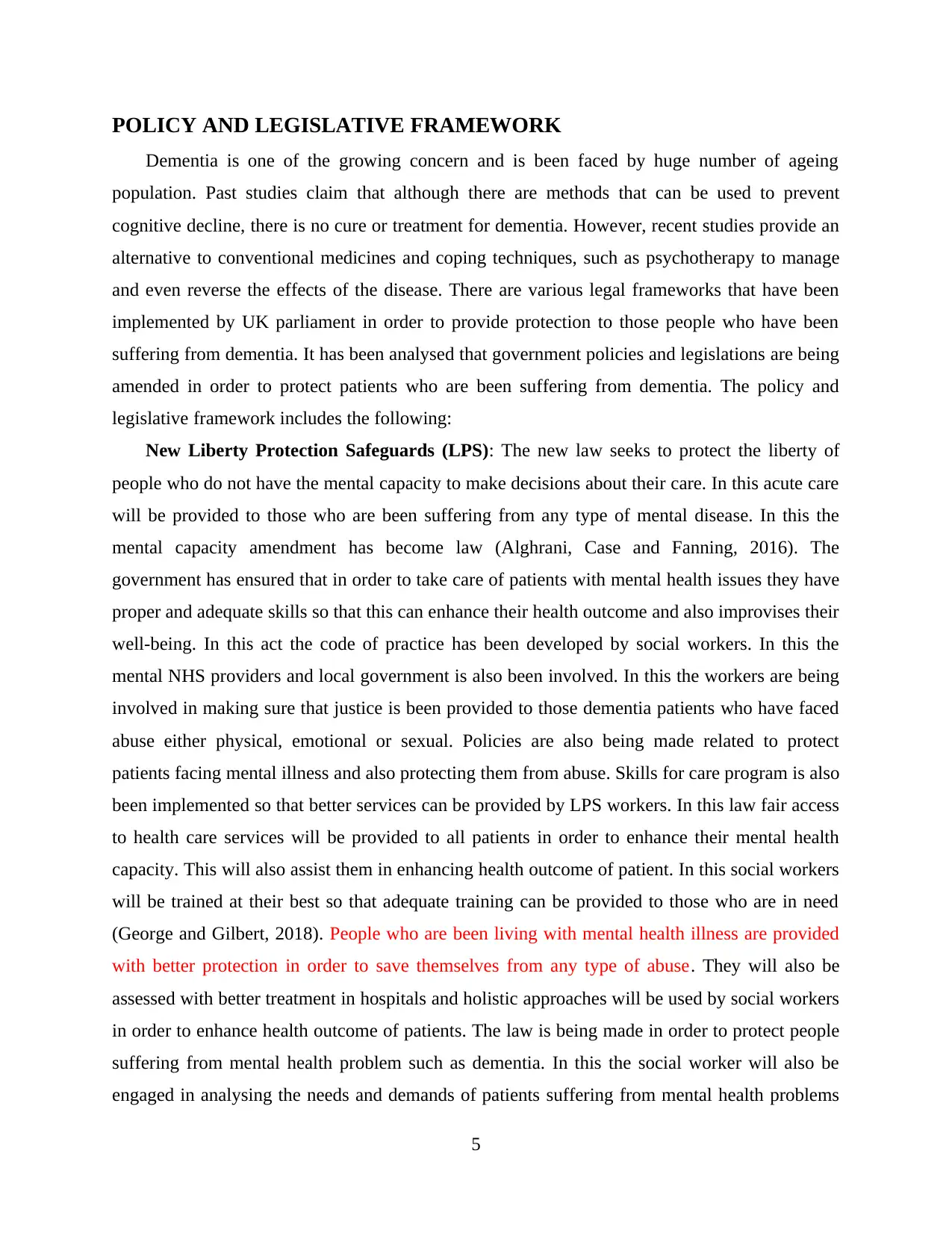
POLICY AND LEGISLATIVE FRAMEWORK
Dementia is one of the growing concern and is been faced by huge number of ageing
population. Past studies claim that although there are methods that can be used to prevent
cognitive decline, there is no cure or treatment for dementia. However, recent studies provide an
alternative to conventional medicines and coping techniques, such as psychotherapy to manage
and even reverse the effects of the disease. There are various legal frameworks that have been
implemented by UK parliament in order to provide protection to those people who have been
suffering from dementia. It has been analysed that government policies and legislations are being
amended in order to protect patients who are been suffering from dementia. The policy and
legislative framework includes the following:
New Liberty Protection Safeguards (LPS): The new law seeks to protect the liberty of
people who do not have the mental capacity to make decisions about their care. In this acute care
will be provided to those who are been suffering from any type of mental disease. In this the
mental capacity amendment has become law (Alghrani, Case and Fanning, 2016). The
government has ensured that in order to take care of patients with mental health issues they have
proper and adequate skills so that this can enhance their health outcome and also improvises their
well-being. In this act the code of practice has been developed by social workers. In this the
mental NHS providers and local government is also been involved. In this the workers are being
involved in making sure that justice is been provided to those dementia patients who have faced
abuse either physical, emotional or sexual. Policies are also being made related to protect
patients facing mental illness and also protecting them from abuse. Skills for care program is also
been implemented so that better services can be provided by LPS workers. In this law fair access
to health care services will be provided to all patients in order to enhance their mental health
capacity. This will also assist them in enhancing health outcome of patient. In this social workers
will be trained at their best so that adequate training can be provided to those who are in need
(George and Gilbert, 2018). People who are been living with mental health illness are provided
with better protection in order to save themselves from any type of abuse. They will also be
assessed with better treatment in hospitals and holistic approaches will be used by social workers
in order to enhance health outcome of patients. The law is being made in order to protect people
suffering from mental health problem such as dementia. In this the social worker will also be
engaged in analysing the needs and demands of patients suffering from mental health problems
5
Dementia is one of the growing concern and is been faced by huge number of ageing
population. Past studies claim that although there are methods that can be used to prevent
cognitive decline, there is no cure or treatment for dementia. However, recent studies provide an
alternative to conventional medicines and coping techniques, such as psychotherapy to manage
and even reverse the effects of the disease. There are various legal frameworks that have been
implemented by UK parliament in order to provide protection to those people who have been
suffering from dementia. It has been analysed that government policies and legislations are being
amended in order to protect patients who are been suffering from dementia. The policy and
legislative framework includes the following:
New Liberty Protection Safeguards (LPS): The new law seeks to protect the liberty of
people who do not have the mental capacity to make decisions about their care. In this acute care
will be provided to those who are been suffering from any type of mental disease. In this the
mental capacity amendment has become law (Alghrani, Case and Fanning, 2016). The
government has ensured that in order to take care of patients with mental health issues they have
proper and adequate skills so that this can enhance their health outcome and also improvises their
well-being. In this act the code of practice has been developed by social workers. In this the
mental NHS providers and local government is also been involved. In this the workers are being
involved in making sure that justice is been provided to those dementia patients who have faced
abuse either physical, emotional or sexual. Policies are also being made related to protect
patients facing mental illness and also protecting them from abuse. Skills for care program is also
been implemented so that better services can be provided by LPS workers. In this law fair access
to health care services will be provided to all patients in order to enhance their mental health
capacity. This will also assist them in enhancing health outcome of patient. In this social workers
will be trained at their best so that adequate training can be provided to those who are in need
(George and Gilbert, 2018). People who are been living with mental health illness are provided
with better protection in order to save themselves from any type of abuse. They will also be
assessed with better treatment in hospitals and holistic approaches will be used by social workers
in order to enhance health outcome of patients. The law is being made in order to protect people
suffering from mental health problem such as dementia. In this the social worker will also be
engaged in analysing the needs and demands of patients suffering from mental health problems
5
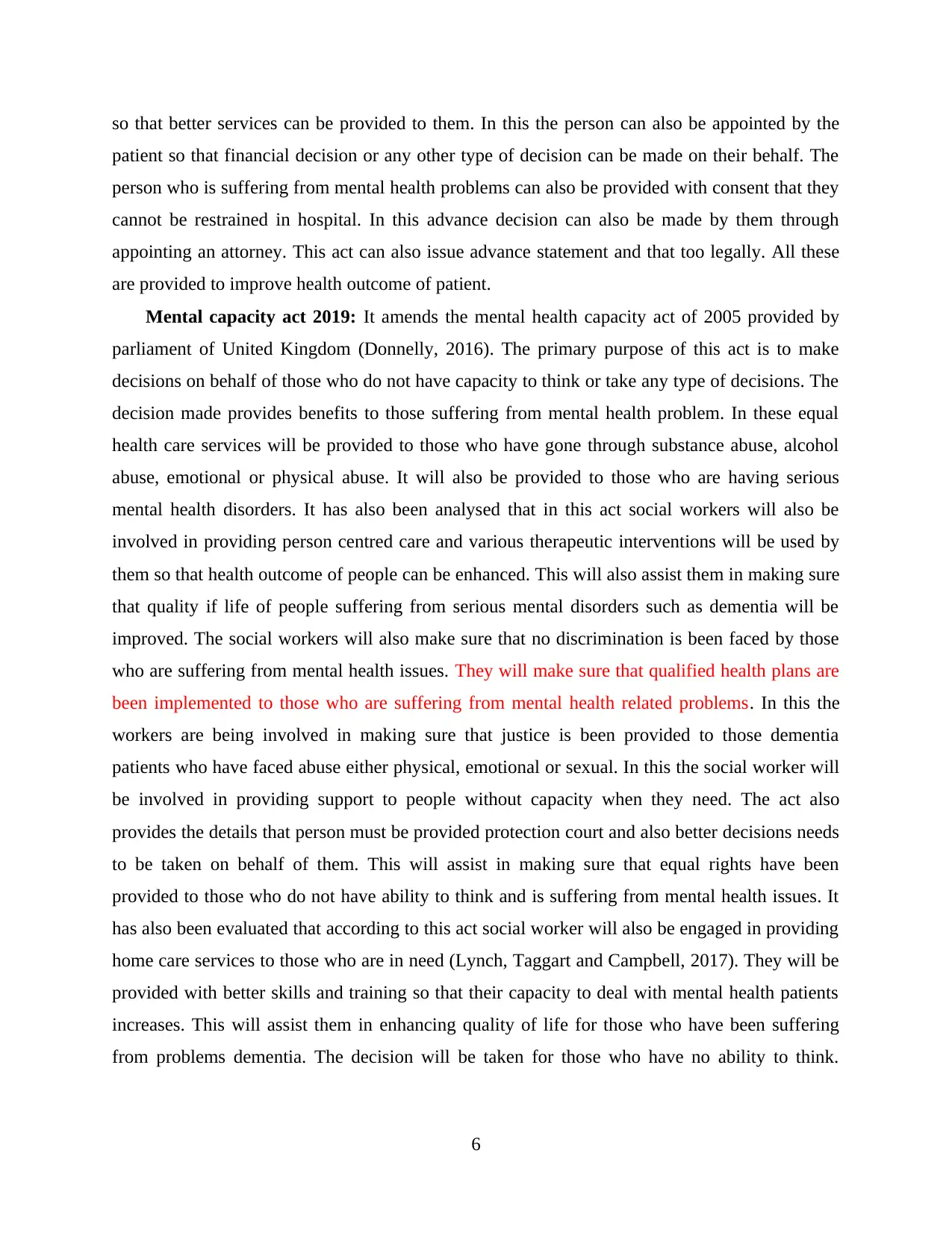
so that better services can be provided to them. In this the person can also be appointed by the
patient so that financial decision or any other type of decision can be made on their behalf. The
person who is suffering from mental health problems can also be provided with consent that they
cannot be restrained in hospital. In this advance decision can also be made by them through
appointing an attorney. This act can also issue advance statement and that too legally. All these
are provided to improve health outcome of patient.
Mental capacity act 2019: It amends the mental health capacity act of 2005 provided by
parliament of United Kingdom (Donnelly, 2016). The primary purpose of this act is to make
decisions on behalf of those who do not have capacity to think or take any type of decisions. The
decision made provides benefits to those suffering from mental health problem. In these equal
health care services will be provided to those who have gone through substance abuse, alcohol
abuse, emotional or physical abuse. It will also be provided to those who are having serious
mental health disorders. It has also been analysed that in this act social workers will also be
involved in providing person centred care and various therapeutic interventions will be used by
them so that health outcome of people can be enhanced. This will also assist them in making sure
that quality if life of people suffering from serious mental disorders such as dementia will be
improved. The social workers will also make sure that no discrimination is been faced by those
who are suffering from mental health issues. They will make sure that qualified health plans are
been implemented to those who are suffering from mental health related problems. In this the
workers are being involved in making sure that justice is been provided to those dementia
patients who have faced abuse either physical, emotional or sexual. In this the social worker will
be involved in providing support to people without capacity when they need. The act also
provides the details that person must be provided protection court and also better decisions needs
to be taken on behalf of them. This will assist in making sure that equal rights have been
provided to those who do not have ability to think and is suffering from mental health issues. It
has also been evaluated that according to this act social worker will also be engaged in providing
home care services to those who are in need (Lynch, Taggart and Campbell, 2017). They will be
provided with better skills and training so that their capacity to deal with mental health patients
increases. This will assist them in enhancing quality of life for those who have been suffering
from problems dementia. The decision will be taken for those who have no ability to think.
6
patient so that financial decision or any other type of decision can be made on their behalf. The
person who is suffering from mental health problems can also be provided with consent that they
cannot be restrained in hospital. In this advance decision can also be made by them through
appointing an attorney. This act can also issue advance statement and that too legally. All these
are provided to improve health outcome of patient.
Mental capacity act 2019: It amends the mental health capacity act of 2005 provided by
parliament of United Kingdom (Donnelly, 2016). The primary purpose of this act is to make
decisions on behalf of those who do not have capacity to think or take any type of decisions. The
decision made provides benefits to those suffering from mental health problem. In these equal
health care services will be provided to those who have gone through substance abuse, alcohol
abuse, emotional or physical abuse. It will also be provided to those who are having serious
mental health disorders. It has also been analysed that in this act social workers will also be
involved in providing person centred care and various therapeutic interventions will be used by
them so that health outcome of people can be enhanced. This will also assist them in making sure
that quality if life of people suffering from serious mental disorders such as dementia will be
improved. The social workers will also make sure that no discrimination is been faced by those
who are suffering from mental health issues. They will make sure that qualified health plans are
been implemented to those who are suffering from mental health related problems. In this the
workers are being involved in making sure that justice is been provided to those dementia
patients who have faced abuse either physical, emotional or sexual. In this the social worker will
be involved in providing support to people without capacity when they need. The act also
provides the details that person must be provided protection court and also better decisions needs
to be taken on behalf of them. This will assist in making sure that equal rights have been
provided to those who do not have ability to think and is suffering from mental health issues. It
has also been evaluated that according to this act social worker will also be engaged in providing
home care services to those who are in need (Lynch, Taggart and Campbell, 2017). They will be
provided with better skills and training so that their capacity to deal with mental health patients
increases. This will assist them in enhancing quality of life for those who have been suffering
from problems dementia. The decision will be taken for those who have no ability to think.
6
⊘ This is a preview!⊘
Do you want full access?
Subscribe today to unlock all pages.

Trusted by 1+ million students worldwide
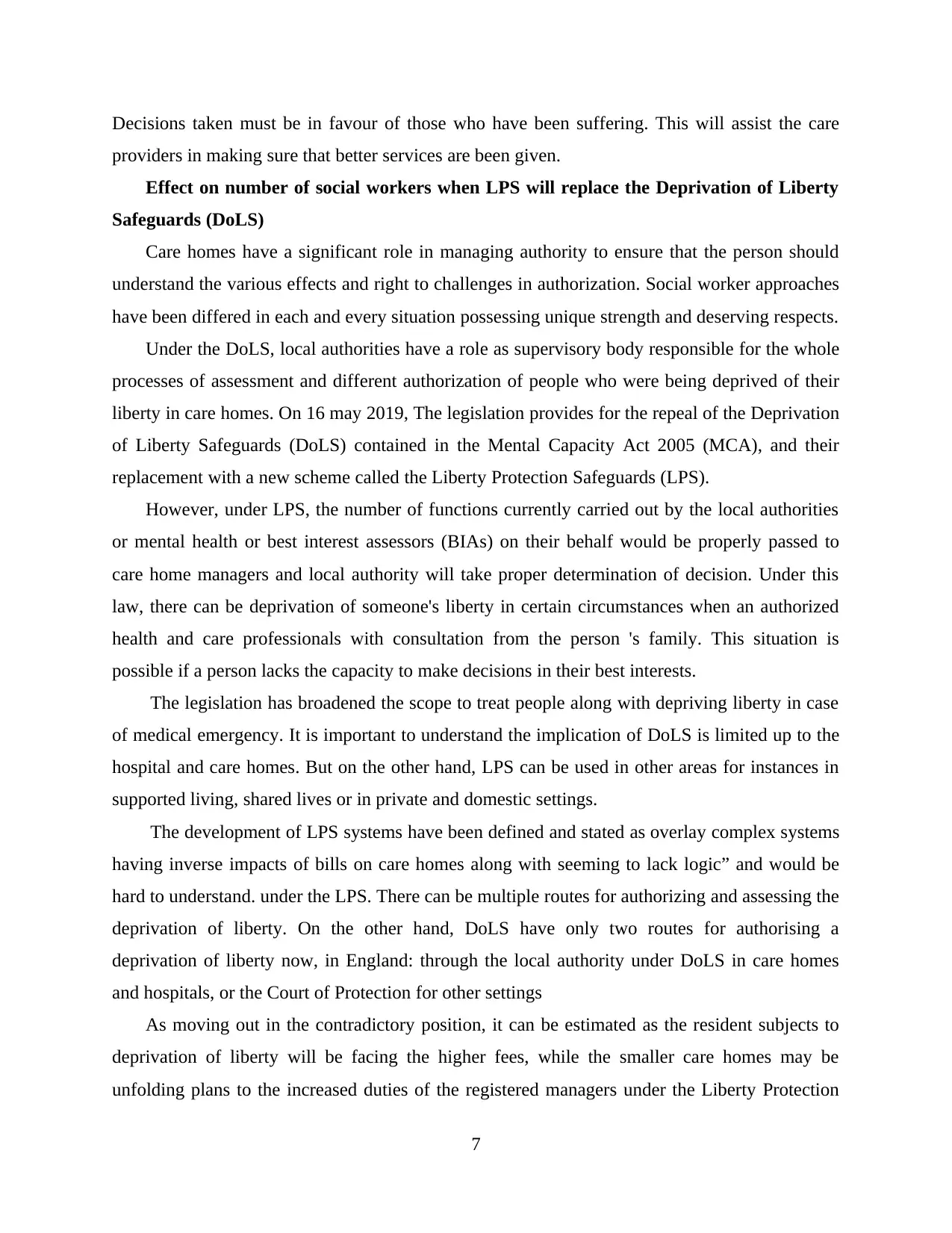
Decisions taken must be in favour of those who have been suffering. This will assist the care
providers in making sure that better services are been given.
Effect on number of social workers when LPS will replace the Deprivation of Liberty
Safeguards (DoLS)
Care homes have a significant role in managing authority to ensure that the person should
understand the various effects and right to challenges in authorization. Social worker approaches
have been differed in each and every situation possessing unique strength and deserving respects.
Under the DoLS, local authorities have a role as supervisory body responsible for the whole
processes of assessment and different authorization of people who were being deprived of their
liberty in care homes. On 16 may 2019, The legislation provides for the repeal of the Deprivation
of Liberty Safeguards (DoLS) contained in the Mental Capacity Act 2005 (MCA), and their
replacement with a new scheme called the Liberty Protection Safeguards (LPS).
However, under LPS, the number of functions currently carried out by the local authorities
or mental health or best interest assessors (BIAs) on their behalf would be properly passed to
care home managers and local authority will take proper determination of decision. Under this
law, there can be deprivation of someone's liberty in certain circumstances when an authorized
health and care professionals with consultation from the person 's family. This situation is
possible if a person lacks the capacity to make decisions in their best interests.
The legislation has broadened the scope to treat people along with depriving liberty in case
of medical emergency. It is important to understand the implication of DoLS is limited up to the
hospital and care homes. But on the other hand, LPS can be used in other areas for instances in
supported living, shared lives or in private and domestic settings.
The development of LPS systems have been defined and stated as overlay complex systems
having inverse impacts of bills on care homes along with seeming to lack logic” and would be
hard to understand. under the LPS. There can be multiple routes for authorizing and assessing the
deprivation of liberty. On the other hand, DoLS have only two routes for authorising a
deprivation of liberty now, in England: through the local authority under DoLS in care homes
and hospitals, or the Court of Protection for other settings
As moving out in the contradictory position, it can be estimated as the resident subjects to
deprivation of liberty will be facing the higher fees, while the smaller care homes may be
unfolding plans to the increased duties of the registered managers under the Liberty Protection
7
providers in making sure that better services are been given.
Effect on number of social workers when LPS will replace the Deprivation of Liberty
Safeguards (DoLS)
Care homes have a significant role in managing authority to ensure that the person should
understand the various effects and right to challenges in authorization. Social worker approaches
have been differed in each and every situation possessing unique strength and deserving respects.
Under the DoLS, local authorities have a role as supervisory body responsible for the whole
processes of assessment and different authorization of people who were being deprived of their
liberty in care homes. On 16 may 2019, The legislation provides for the repeal of the Deprivation
of Liberty Safeguards (DoLS) contained in the Mental Capacity Act 2005 (MCA), and their
replacement with a new scheme called the Liberty Protection Safeguards (LPS).
However, under LPS, the number of functions currently carried out by the local authorities
or mental health or best interest assessors (BIAs) on their behalf would be properly passed to
care home managers and local authority will take proper determination of decision. Under this
law, there can be deprivation of someone's liberty in certain circumstances when an authorized
health and care professionals with consultation from the person 's family. This situation is
possible if a person lacks the capacity to make decisions in their best interests.
The legislation has broadened the scope to treat people along with depriving liberty in case
of medical emergency. It is important to understand the implication of DoLS is limited up to the
hospital and care homes. But on the other hand, LPS can be used in other areas for instances in
supported living, shared lives or in private and domestic settings.
The development of LPS systems have been defined and stated as overlay complex systems
having inverse impacts of bills on care homes along with seeming to lack logic” and would be
hard to understand. under the LPS. There can be multiple routes for authorizing and assessing the
deprivation of liberty. On the other hand, DoLS have only two routes for authorising a
deprivation of liberty now, in England: through the local authority under DoLS in care homes
and hospitals, or the Court of Protection for other settings
As moving out in the contradictory position, it can be estimated as the resident subjects to
deprivation of liberty will be facing the higher fees, while the smaller care homes may be
unfolding plans to the increased duties of the registered managers under the Liberty Protection
7
Paraphrase This Document
Need a fresh take? Get an instant paraphrase of this document with our AI Paraphraser

Safeguards (LPS). it is important to note the care home sector will be ill equipped for along with
the new responsibilities. The staff and social care homes would be inadequately trained and fund
to carry out the responsibilities under the framework which would be replaced.
This could result in higher fees for residents to LPS and the smaller homes will be closed
another will not be set up enduring additional burdens. Hence, it can be stated as changes are
coming and debate will be falling out to have the right balances between protecting people
making the process manageable.
8
the new responsibilities. The staff and social care homes would be inadequately trained and fund
to carry out the responsibilities under the framework which would be replaced.
This could result in higher fees for residents to LPS and the smaller homes will be closed
another will not be set up enduring additional burdens. Hence, it can be stated as changes are
coming and debate will be falling out to have the right balances between protecting people
making the process manageable.
8
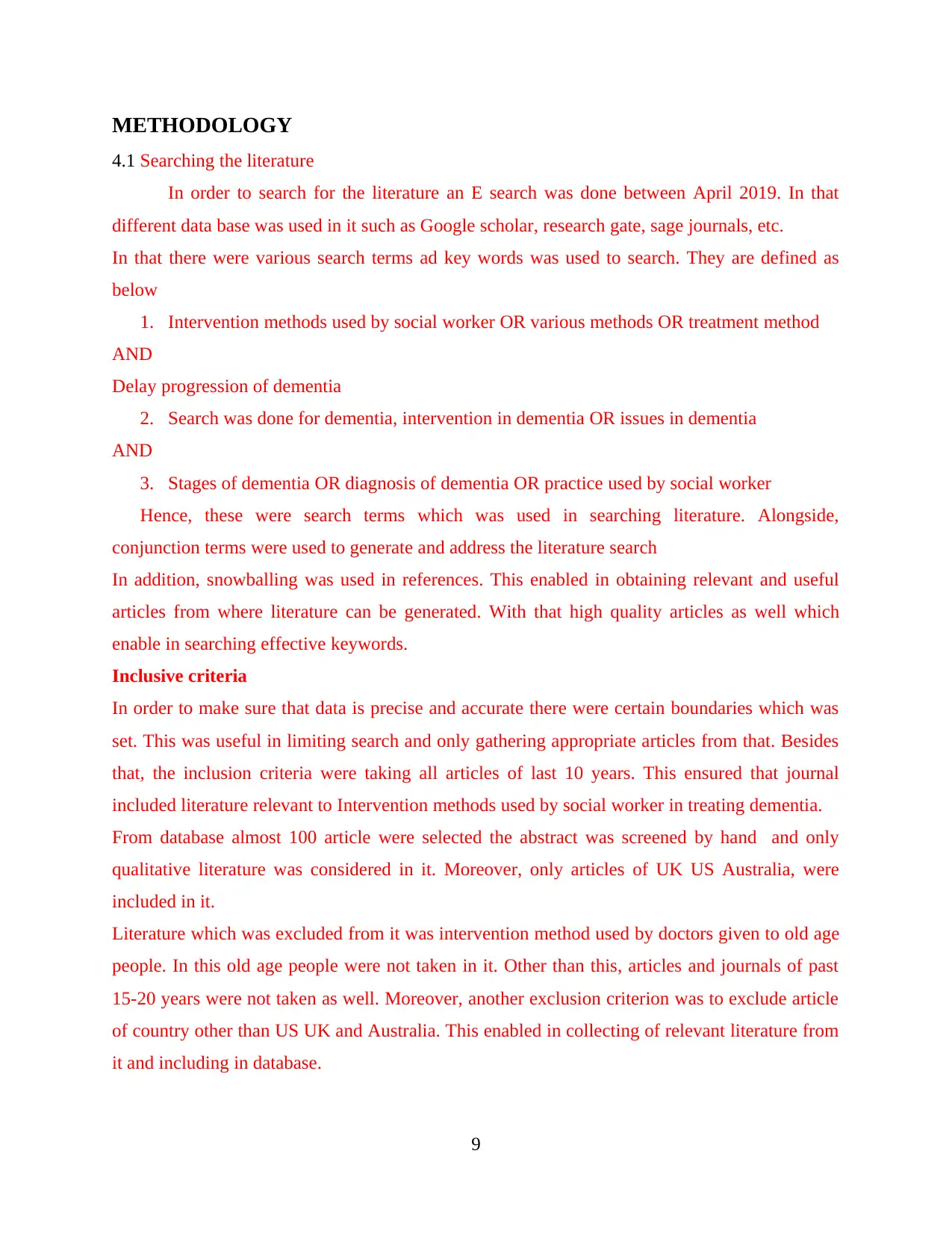
METHODOLOGY
4.1 Searching the literature
In order to search for the literature an E search was done between April 2019. In that
different data base was used in it such as Google scholar, research gate, sage journals, etc.
In that there were various search terms ad key words was used to search. They are defined as
below
1. Intervention methods used by social worker OR various methods OR treatment method
AND
Delay progression of dementia
2. Search was done for dementia, intervention in dementia OR issues in dementia
AND
3. Stages of dementia OR diagnosis of dementia OR practice used by social worker
Hence, these were search terms which was used in searching literature. Alongside,
conjunction terms were used to generate and address the literature search
In addition, snowballing was used in references. This enabled in obtaining relevant and useful
articles from where literature can be generated. With that high quality articles as well which
enable in searching effective keywords.
Inclusive criteria
In order to make sure that data is precise and accurate there were certain boundaries which was
set. This was useful in limiting search and only gathering appropriate articles from that. Besides
that, the inclusion criteria were taking all articles of last 10 years. This ensured that journal
included literature relevant to Intervention methods used by social worker in treating dementia.
From database almost 100 article were selected the abstract was screened by hand and only
qualitative literature was considered in it. Moreover, only articles of UK US Australia, were
included in it.
Literature which was excluded from it was intervention method used by doctors given to old age
people. In this old age people were not taken in it. Other than this, articles and journals of past
15-20 years were not taken as well. Moreover, another exclusion criterion was to exclude article
of country other than US UK and Australia. This enabled in collecting of relevant literature from
it and including in database.
9
4.1 Searching the literature
In order to search for the literature an E search was done between April 2019. In that
different data base was used in it such as Google scholar, research gate, sage journals, etc.
In that there were various search terms ad key words was used to search. They are defined as
below
1. Intervention methods used by social worker OR various methods OR treatment method
AND
Delay progression of dementia
2. Search was done for dementia, intervention in dementia OR issues in dementia
AND
3. Stages of dementia OR diagnosis of dementia OR practice used by social worker
Hence, these were search terms which was used in searching literature. Alongside,
conjunction terms were used to generate and address the literature search
In addition, snowballing was used in references. This enabled in obtaining relevant and useful
articles from where literature can be generated. With that high quality articles as well which
enable in searching effective keywords.
Inclusive criteria
In order to make sure that data is precise and accurate there were certain boundaries which was
set. This was useful in limiting search and only gathering appropriate articles from that. Besides
that, the inclusion criteria were taking all articles of last 10 years. This ensured that journal
included literature relevant to Intervention methods used by social worker in treating dementia.
From database almost 100 article were selected the abstract was screened by hand and only
qualitative literature was considered in it. Moreover, only articles of UK US Australia, were
included in it.
Literature which was excluded from it was intervention method used by doctors given to old age
people. In this old age people were not taken in it. Other than this, articles and journals of past
15-20 years were not taken as well. Moreover, another exclusion criterion was to exclude article
of country other than US UK and Australia. This enabled in collecting of relevant literature from
it and including in database.
9
⊘ This is a preview!⊘
Do you want full access?
Subscribe today to unlock all pages.

Trusted by 1+ million students worldwide
1 out of 46
Related Documents
Your All-in-One AI-Powered Toolkit for Academic Success.
+13062052269
info@desklib.com
Available 24*7 on WhatsApp / Email
![[object Object]](/_next/static/media/star-bottom.7253800d.svg)
Unlock your academic potential
Copyright © 2020–2026 A2Z Services. All Rights Reserved. Developed and managed by ZUCOL.




